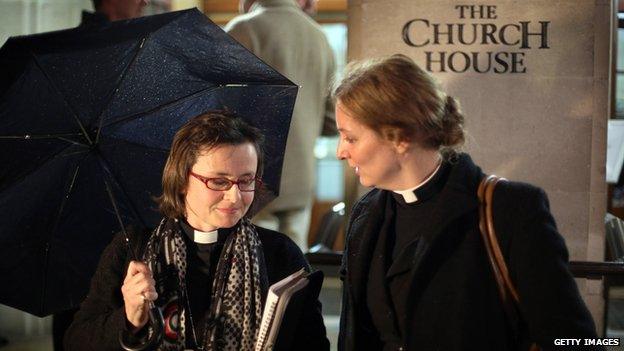Women bishops: A century-long struggle for recognition
- Published

Only in the last 20 years has the Church of England allowed women priests.
The rejection of women bishops by the general synod of the Church of England is the latest twist in a long story going back a century to the time of the suffragettes.
In 1920, no fewer than nine motions concerning "The Position of Women in the Councils and Ministrations of the Church" came before the Lambeth conference, the international gathering of Anglican leaders.
"The time has come..." opens one of the resolutions in the Lambeth conference archive, external, reflecting the on-going campaign of the suffragettes to gain equal rights for women including the vote.
But the Lambeth measures go no further than to permit women to become deaconesses, an office that fell short of full ministry or ordination to the priesthood.
It was another 50 years before the Anglican Church passed a motion favouring women's ordination.
Women began seriously looking at their roles within the Church in the 1960s, according to Kate Cooper, professor of ancient history at Manchester University.
"There was a low-key movement of women re-assessing their participation in the big 19th century institutions in post-war Britain, particularly during the '60s... in that sense World War II was a much more significant event for women in the Church than World War I".
The Church passed a motion favouring women's ordination in 1975, but it was not till 1992 that the vote to permit the ordination of women was passed. On 12 March 1994, the first 32 women were ordained as Church of England priests.
However, in order to pass the measure, a compromise was struck with those members of the Church opposed to the ministry of women. Parishes opposed could choose to be ministered by a male alternative.
This scenario was famously satirised by the BBC comedy series The Vicar of Dibley.
At the time there were fears of a large exodus of clergy, but in fact fewer than 5% of the 10,480 full-time clergy left.
Today women make up a third of the Anglican clergy in England. To many of the defeated lobbyists, the latest vote on women bishops leaves the Church open to ridicule, as they claim it puts the Church at odds with wider society in terms of equal opportunities for women.
"I think many female clergy will seriously consider their position in the Church, and what they feel they can do to ensure their careers can be advanced," Church of England newspaper , externalreporter Amaris Cole told the BBC.
"However, Dr Williams has assured these women that this issue cannot be 'parked' and that talks were already going on as to the next move for women to be allowed to be ordained to the episcopate. The message is: although it failed this time, this is not the end."
Ireland and Scotland both allow female bishops - though none have been elected yet. Wales, like England, allows women to be deacons and priests but not bishops.
Just a few days before the Synod vote, Swaziland consecrated its first female Anglican bishop - the Right Reverend Ellinah Wamukoya.
Her appointment was seen as a significant move for women's rights in a country which has often been accused of having a patriarchal philosophy.
"I am going to try to represent the mother attribute of God," Bishop Wamukoya told reporters.
The 61-year-old added: "A mother is a caring person but at the same time, a mother can be firm in doing whatever she is doing."
The first female bishop ordained in the Anglican Communion was Barbara Harris in 1989. Her ordination as Suffragan Bishop for Massachusetts, in the USA, caused outrage among conservative Episcopalians (another name for Anglicans) but since then over a dozen women have been elected to the episcopate in America.
In 2006 the Episcopalian Church in the United States became the first province of the Anglican Communion to elect a woman to the role of Primate (a senior bishop - the equivalent of an archbishop) - the Most Reverend Katharine Jefferts Schori.
Meanwhile more conservative communions like Nigeria do not allow women's ordination at all.
The Church's position on female ordination has been seen as both a religious matter and a wider statement on the rights of women in society.
Many fear the synod's latest vote will reinforce a view of the Church being outdated.
"Twitter was littered with claims that the Church is a sexist organisation and stuck in the past," said Ms Cole.
"But I think it's important to remember that the majority of the Church are in favour of women bishops - and this vote is not representative of the Church's view on women."
- Published21 November 2012
- Published21 November 2012